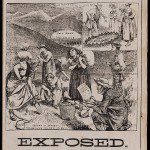We are continuing with our series: “How I Do Research.” Our goal is to learn from respected, prolific scholars who have spent many years doing research and writing. Today I am honored to offer my interview with Dr. Michael J. Gorman, author of many books including several outstanding textbooks such as Elements of Biblical Exegesis and Apostle of the Crucified Lord (expect a new edition in the not-too-distant-future!). He also penned an important monograph that inspired me to pursue biblical studies, Cruciformity. Check out more books here.

How do you approach research as a whole? Do you have a big-picture
strategy? Do your research all at once, and then write? Do you do some
sketching and reflecting on paper and then dig into research? Do you go
back and forth?
I tend to have a working thesis before I start the research and writing process on a particular project. This thesis often ends up in a Word file called “Notes on ________,” where I will also start to type out an outline, a few key ideas, etc. (See further under #2.) If I have more than a bare thesis or outline in mind, I will also get that down onto paper or immediately into the Word file. I then start the research process (again, see further under #2) and go back and forth between research and writing. Once I decide I want to use a source, I try to skim it to figure out how it might contribute to the project and then go back later to work through it page by page, line by line, or whatever. Once I am into the writing phase, I may abandon the use of new “Notes” files and put everything into a working document, even if some of it has to be extracted later and saved as a file called “Extra Material on ______.” Such files become useful if the project is expanded and/or revised at a later point.I should add to this that I have an exegetical notebook (printed Greek and/or English text), with my own exegetical notes and some research notes and quotes, for a number of NT books. These notebooks often become the basis of my exegetical writing.
2. What kind of notes do you take (ideas, quotes, etc.)? How do you organize them?
To quote Einstein when asked by a young boy (now a retired colleague of mine) what he did with his time, he answered, “I think a lot.” Not that I am an Einstein by any stretch, but I am always thinking about topics I am interested in and writing down notes, potential outlines of lectures and articles, thesis statements, key sentences in an argument, and the like. These are on random pieces of paper, on post-it notes, and (when I’m organized), in spiral-bound notebooks. If I know I’m going to research and write about a particular topic, I do this deliberately and in a focused way. Otherwise it is somewhat random and even serendipitous. Eventually these notes make it into one of those computer files called “Notes on ______,” such as “Notes on Mission in Revelation” or “Notes on Roman Stoic Ethics.” This then leads to reading around in books and articles, and online, to see who some of the key contributors to the issue are (if I don’t know) and the big picture of what they say. (Since I often have a research assistant, this is frequently where he or she provides help–identifying and summarizing potential resources.) I will often add a summary of their main ideas to my “Notes” file, along with a few quotes I may want to use in a lecture or essay or book.
3. What kind of tools do you use for researching and collecting
information? (software? Do you store notes in Endnote? Dropbox? Evernote?
Filing cabinet?)
I am very old fashioned, I suppose: I like hard copies of photocopied or downloaded documents that I can highlight and put in a file folder or notebook; electronic pdfs that I can highlight and store electronically, when I can obtain them; and Word files. I am planning to create a universal bibliography for myself, but even that will be a Word document.
4. What have you learned about doing research, collecting notes, and the
process of writing throughout your career – put another way, if you could
get into a time machine and go back twenty years (or ten years), what
advice would you want to give to your younger self about the process of
research and how you take notes and read scholarship?
Start creating electronic files of notes earlier in life!











